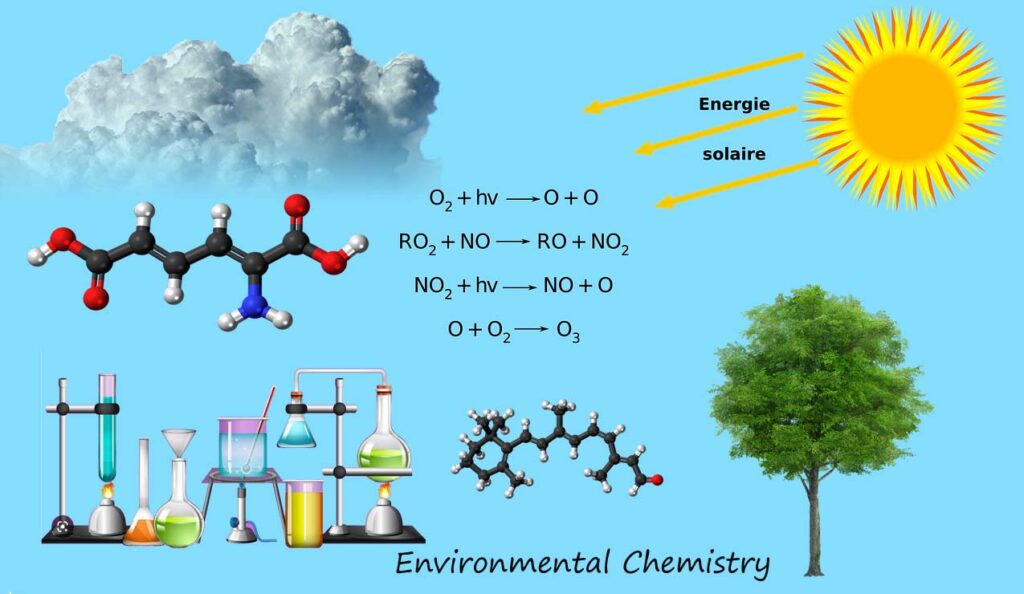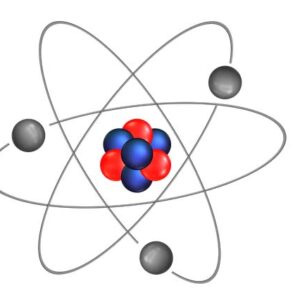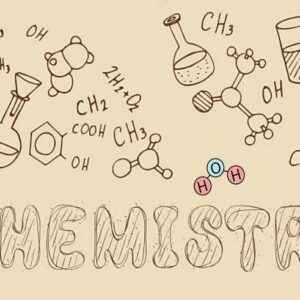
The scientific study of chemical and biological events that take place in natural surroundings is known as environmental chemistry. Its primary goal is to comprehend the origins, processes, movement and fate of chemical species in the air, water and soil as well as how human activities affect these processes.
The following are some of the major fields of study in Environmental chemistry:
- Air pollution: The study of the causes and consequences of gases and particulate matter pollution in the atmosphere.
- Water pollution: the investigation of the origins and results of pollutants in freshwater and marine ecosystems, such as nutrient enrichment, heavy metal pollution and the persistence of harmful substances in the environment.
- Soil pollution: The investigation of the causes and results of soil pollutants, such as heavy metal poison and the lingering effects of pesticides and other chemicals.
- Climate change: The investigation of the physical and chemical mechanisms causing climate change, particularly the part played by greenhouse gases, aerosols and other airborne pollutants.
- Environmental toxicology: the study of how contaminants affect ecosystems and living things.
- Environmental analytical chemistry: the study of analytical methods including gas chromatography, mass spectrometry and inductive coupled plasma mass spectrometry that are used to identify and measure pollutants in the environment.
- Environmental remediation: the research of methods and technologies for decontaminating sites and reestablishing ecosystems.
- Environmental laws and policies: the investigation of the laws and rules governing the control of environmental contaminants and the effects of these laws and rules on the environment and human health.
- Sustainable chemistry: is the study of how to create, use and develop chemical goods and procedures with the least possible negative effects on the environment.
- Environmental destiny and transport: This is the study of how pollutants move through the environment and how they are altered by biological, chemical and physical processes.
- Environmental geochemistry: The study of the chemical interactions between the atmosphere, oceans and solid Earth of the planet including how natural processes affect how elements and compounds behave in the environment.
- Environmental microbiology: This field of study examines the function of microbes in environmental processes such as the biodegradation of contaminants and the nutrient cycling in natural systems.
- Environmental health: is the study of how pollutants affect human health including the mechanisms by which they hurt us and the creation of methods to limit risk and exposure to pollutants.
- Energy and the environment: This field of study examines how energy usage and production affect the environment including how fossil fuels, nuclear energy and renewable energy sources affect air and water quality climate change and land use.
- Environmental modelling and simulation: The application of mathematical models and computer simulations to forecast the movement and destiny of pollutants in the environment and assess the efficacy of various management approaches.
- Environmental forensics: The application of scientific principles and analytical methods to pinpoint the origin and vintage of pollutants and to support judicial and administrative actions pertaining to environmental contamination.
- Green chemistry: The conception, creation and use of chemical products and procedures that lessen or do away with the use and production of hazardous substances
- Nanotechnology and the environment: The study of nanoscale materials’ behaviour, fate and effects in the environment include any possible toxicity to humans or other living things, is known as nanotechnology and the environment.
- Environmental chemistry of the ocean: is the study of the chemical cycles and processes that take place there including how human activity affects the chemistry of the ocean and how the ocean influences climate.
- Environmental chemistry of the Arctic: is the study of the chemical processes and cycles that take place there including how human activity and climate change affect Arctic ecosystems and how the Arctic influences global climate.
- Environmental remote sensing: The measurement and monitoring of environmental variables, such as the concentrations and distributions of contaminants in the atmosphere and water, using satellites, aircraft and ground-based devices.
- Environmental education and outreach: Using science communication, education and outreach to increase public awareness of environmental concerns, educate the public on them and encourage environmentally friendly conduct
- Urban environmental chemistry: This field of study examines the origins, movement and destiny of pollutants in urban settings, as well as the consequences of urbanisation on the quality of the air, water and soil, as well as the implications of urban settings on human health.
- Environmental chemistry of food systems: This field of study examines the chemical cycles and processes that take place within food systems include the effects of agricultural practises on food quality and safety, the influence of food storage and packaging on food chemistry and the environmental effects of food production and consumption.
- Environmental chemistry of emerging pollutants: The study of novel or developing pollutants that are not yet controlled, such as microplastics, endocrine-disrupting substances and other synthetic chemicals, is known as environmental chemistry of emerging pollutants.
- Environmental chemistry of waste: is the study of the origins, movement, disposition and effects of waste and its constituent parts. This includes the effects of waste management procedures on the environment and human health, the function of waste in the environmental cycling of nutrients and other elements and the implications of waste for resource and energy recovery.
- Environmental chemistry in developing countries: The study of environmental chemistry issues unique to developing nations, such as the lack of access to clean water and adequate sanitization, the lack of resources for environmental management and monitor and the effects of economic development on the environment.
- Environmental chemistry in space: is the study of how space exploration affects the environment, the potential health impacts of space flight and the chemistry of the space environment and how it relates to the hunt for extraterrestrial life.
- Environmental chemistry of natural products: This field of study examines the chemical elements present in natural products, such as plants and animals and considers how they might be used in the treatment of disease, the production of food and other industries.
- Environmental chemistry of coastal and marine habitats: is the study of the chemical processes and cycles that take place in these environments, as well as the effects of human activity on them and their function in controlling the temperature of the planet.
- Polar environmental chemistry: The study of the chemical cycles and processes that take place there, as well as the effects of climate change and human activity on these environments and the function of polar regions in controlling the climate of the planet.
- Environmental chemistry of the atmosphere: is the study of the chemical cycles and processes that take place there including the effects of human activity on the atmosphere and the atmosphere’s function in controlling the climate of the planet.
- Environmental chemistry of geothermal systems: is the study of the chemical cycles and processes that take place in these systems, as well as the effects of human activity on them and their function in controlling the climate of the planet.
- Mineral resource environmental chemistry: is the study of the chemical cycles and processes that occur in mineral resources including the effects of human activity on mineral resources and the function of mineral resources in regulating the Earth’s climate.
- Environmental chemistry in industry: is the study of the chemical cycles and processes that take place in industrial settings, as well as how human activity affects these environments and how industry influences climate change.
- Environmental chemistry of mining: The study of the chemical cycles and processes that take place in mining environments including the consequences of mining operations on the quality of the air, water and soil as well as the environment and human health.
- Environmental chemistry of fire: The study of the chemical cycles and processes that take place during flames including the consequences of fires on the quality of the air, water and soil as well as the environment and human health.
- Environmental chemistry of natural disasters: The study of the environmental chemistry of natural disasters which includes the effects of natural disasters on the quality of the air, water and soil as well as the implications of natural disasters on human health and the environment.
- Environmental chemistry of bioremediation: The study of the chemical cycles and processes that take place during bioremediation including the employment of microorganisms to clean up contaminated areas and the impact of bioremediation on human health and the environment.
- Environmental chemistry of atmospheric chemistry: The study of the chemical cycles and processes that take place in the atmosphere including how human activities affect atmospheric chemistry and how atmospheric chemistry affects climate.
- Environmental chemistry of environmental monitoring: The study of the chemical cycles and processes that take place during environmental monitoring including the use of analytical techniques to identify and measure environmental pollutants and the effects of environmental monitoring on the environment and human health.
- Environmental chemistry of environmental regulations and policies: Environmental chemistry is the study of the chemical cycles and processes that take place during the application of environmental laws and policies as well as their impacts on the environment and human health.









